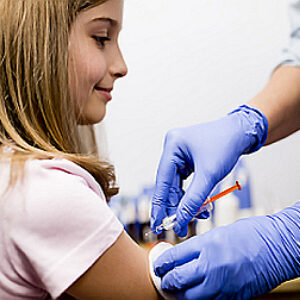Pertussis, also known as whooping cough, is a highly contagious respiratory illness.1 It is transmitted from person to person through respiratory droplets, like coughing or sneezing. Pertussis is a vaccine-preventable disease.
Pertussis, or whooping cough, is a highly contagious disease involving the upper respiratory tract.1 It is caused by the bacterium Bordetella pertussis that can be found in the mouth, nose, and throat of an infected person. The bacteria attach to the tiny, hair-like extensions, known as cilia, found in the upper respiratory tract. The bacteria then release toxins which damage the cilia and cause the airways to swell. This disease is only found in humans.1
The bacteria that causes whooping cough spreads from person to person through the air when an infected person coughs or sneezes.1 As they cough, talk, or sneeze, they exhale tiny particles into the air with bacteria in them, which can then be breathed in by other people.
People can spread the disease from the time that symptoms start and for several weeks after the coughing begins, or until an appropriate antibiotic treatment is completed.1 Whooping cough is very serious, especially for infants and young kids.2 Some people, particularly older adults and teens, may have mild symptoms and not realize they’re infected. In some cases, older siblings or adults who do not know they have pertussis infect other people, especially infants.1
Pertussis symptoms typically begin with 5 to 10 days, but it may take up to 21 days (three weeks).3 The early symptoms last for up to two weeks and resemble those of the common cold, including
Within two weeks, the cough becomes more severe with coughing fits characterized by episodes of many rapid coughs followed by a gasping for air with a high-pitched “whooping” sound.3 This extreme coughing may cause patients to
These coughing fits can last a few weeks to as long as 10 weeks. Completing an appropriate course of antibiotics can significantly shorten the duration of symptoms. The cough tends to get worse as the illness progresses, but it will taper off after treatment.3
Many infants with whooping cough do not cough, instead, they have life-threatening pauses in breathing, called apnea. Apnea can cause the infant to turn blue (cyanosis), or they may struggle to breathe. Same infants may have cold-like symptoms for the entire illness.3
Age and underlying medical conditions are the greatest risk factors for severe illness.1 People at greatest risk for severe illness include2:
Pertussis can cause serious and sometimes life-threatening complications in infants and young children, especially those who are not fully vaccinated.3
Due to its similarity to other respiratory illnesses, whooping cough can be difficult to diagnose.1 Health care providers diagnose whooping cough by taking a history of signs and symptoms and conducting a physical exam and performing a1:
Catching whooping cough early, before coughing fits begin, is important6 People who are sick with whooping cough can be treated with antibiotics, but it’s important to start treatment before three weeks of illness. After three weeks, antibiotics are less likely to help. This is because the infection-causing bacteria are gone, but the airways have been damaged and will take time to heal—and symptoms from that damage may still be present.
If symptoms become more severe, treatment in a hospital may be necessary. Hospital treatment usually focuses on6
Most people can take care of their symptoms at home by doing the following6:
Do not take cough medicine unless your medical provider recommends it.6 Cough medicine isn’t likely to help and isn’t recommended for children younger than 4.
Pertussis is preventable—and severe illness can be prevented by being vaccinated for pertussis and by completing a course of antibiotics if you are infected with pertussis or exposed to someone with pertussis.1
In 2019 and 2020, there were 178 and 90 cases of whooping cough reported in Spokane County, respectively. Case rates for those years were above Spokane County’s five-year average. See the communicable disease dashboard to see county, state and national rates.
Take steps to prevent the spread of pertussis just as you would for
other respiratory illnesses like flu or COVID-19. Prevention measures
like getting vaccinated, completing treatment if positive, receiving PEP
in case of exposure, and practicing good respiratory illness hygiene
are effective at preventing the spread of pertussis.

Getting vaccinated is the best way to prevent pertussis.1
Practicing good respiratory hygiene is always recommended to prevent the spread of respiratory illnesses, including pertussis1,11:
If you have been exposed to pertussis, contact your doctor to find out what steps to take. They may recommend that you receive PEP (antibiotics) to help prevent you from becoming sick.

Protect your baby from the risks and dangers of pertussis.

Learn about what immunization is, why it's important, and when to get certain vaccines.

Information about pertussis vaccines from the Centers for Disease Control and Prevention